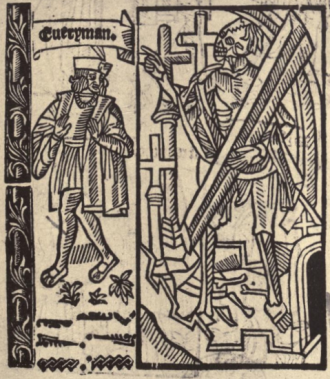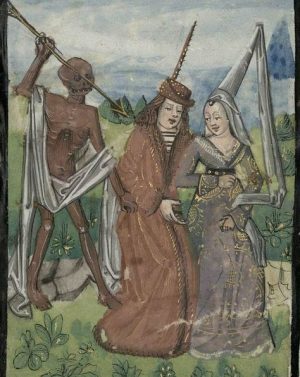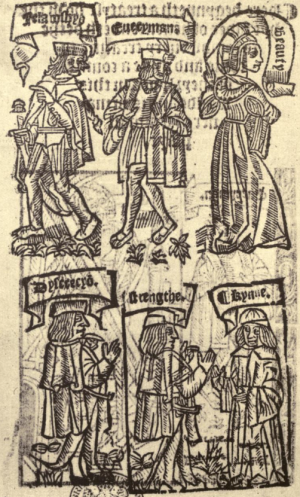Title: The Summoning of Everyman. 
Author: Unknown.
Written: c. 1490-1510.
Earliest Extant Complete Edition: c. 1520s.
Genre: Morality Play.
Language Difficulty Rating: 4 (not difficult).
Setting: Anywhere, Everywhere.
The Summoning of Everyman (usually referred to simply as Everyman) is the most famous surviving example of the didactic dramatic form known as the morality play, a style of drama which thrived in the 15th and early 16th centuries in England. Not so well known is the fact that the English version of Everyman is actually a translation of a Dutch original.
 Why should you read Everyman?
Why should you read Everyman?
(1) The story of Everyman does not simply or simplistically warn men and women everywhere to lead moral lives. The play is actually a carefully crafted work which meticulously explains, through the actions and speeches of the characters, how exactly Catholic doctrine must be applied to our lives if we wish to receive God’s grace and be saved, so that we may spend eternity in Heaven. Our edition of Everyman is the first one ever to explain, via the annotations, the painstakingly detailed Catholic doctrine that is revealed in the text. We gratefully acknowledge that we have adapted our explanations of the Catholic dogma expounded in Everyman from a 1957 article written by the scholar Lawrence V. Ryan (1923-2019), a professor of English at Stanford University.
(2) Though a short and rather primitive play compared to those that were to be written in the great era of Elizabethan drama which were to written less than a century its appearance, Everyman is surprisingly moving play, as well as an effective one, one that may also give you pause (if you are a believer) to meditate on your relationship with God.
 (3) Everyman is essentially written as one long act, and is typically printed as such. However, the play is comprised of theologically distinct parts, and so, as way to facilitate appreciation and understanding of those distinctions, we present Everyman as a five-act play.
(3) Everyman is essentially written as one long act, and is typically printed as such. However, the play is comprised of theologically distinct parts, and so, as way to facilitate appreciation and understanding of those distinctions, we present Everyman as a five-act play.
 (4) Everyman was written in Middle English. Unlike other modern editions, we preserve many of the original word forms in order to give the reader a sense of what the play may have sounded like when it was performed around the turn of the 16th century. But do not worry, the annotations will prevent you from getting lost or confused as you read!
(4) Everyman was written in Middle English. Unlike other modern editions, we preserve many of the original word forms in order to give the reader a sense of what the play may have sounded like when it was performed around the turn of the 16th century. But do not worry, the annotations will prevent you from getting lost or confused as you read!
(5) We offer two script versions of Everyman to our readers and performers: the first keeps the same Middle English word forms which we preserved in our annotated version; in the second, however, we refashion the old-word forms into their modern versions (show for shew, if for and where appropriate, damnable for dampnable, etc.
Our Story: Everyman has lived a sinful life, and God is unhappy. God sends Death to claim Everyman, who realizes he may be damned for his life’s unsavoury behaviour. Can Everyman be redeemed?
Download Everyman:
On-line Reading:
Annotated Edition, pdf
White Background for Printing:
Annotated Edition, pdf
Theatre Script, old language:
Everyman Script
Theatre Script, modernized:
Everyman Modern Script